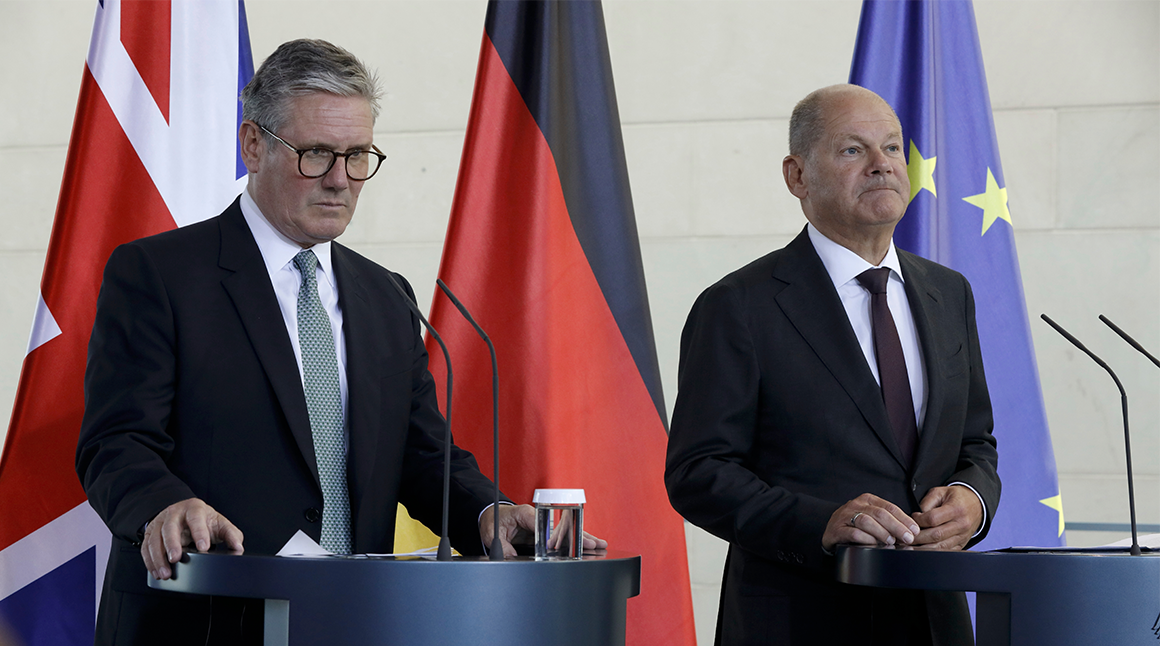Speak to an Expert
admin@eumediation.net
Posted on: September 9th, 2024

In an announcement this Saturday (Sept 7th, Reuters), we hear that Britain and Ireland are moving ‘from friction back to friendship’, as UK Premier Keir Starmer visited Irish Taoiseach Simon Harris in Dublin.
And a couple of weeks ago, Starmer was in Berlin meeting German PM Olaf Scholz, who said he wanted to ‘…take the outstretched hand’ of the UK, as he and Starmer began work on a new defence agreement and cooperation treaty, both scheduled for next year.
And of course, let’s not forget that Starmer also then hopped over to France to meet President Macron, where they agreed ‘…on the importance of further strengthening and broadening the close relationship between the UK and France in the coming months': specifically to attempt to dismantle migrant smuggling routes and to increase intelligence-sharing.
Amid this flurry of European alliance-building, Starmer has been at pains to emphasise that there is no intention to reverse Britain’s 2020 exit from the EU, although the cynics amongst us might notice that everything he wants to now achieve in terms of trade, defence, free movement of people, and much more, were already in place for Britain pre-Brexit.
As mediators working in businesses across the whole of Europe, we are brought in to ‘reset relations’ when there are disputes between people at all levels of seniority within organisations. There has been a fall-out between two or more parties, perhaps a critical incident, usually drawing in other people from around the periphery of the conflict, and often leading to the threat or reality of formal action. We build dialogue, we foster collaboration, we support the parties to focus on the future of their relationship, and ultimately we provide the conditions for a reset to take place.
It can be a mammoth task to move on from a wrecked or spoiled relationship. How we accomplish the task depends on whether we need or want to remain on good terms with the other person.
So, in a lot of disputes, people might choose to never try and restore things with their adversary: neighbours who fall out may just ignore each other, passing in the street or corridor while looking the other way; business relations, such as between a purchaser and a supplier, may never be repaired and don’t have to be: the two sides just choose to trade with someone else.
However, there are settings in which the relationship really has to be reset. When family members have had significant conflict, for example, there is a greater imperative to try and preserve family relationships for the good of others: we don’t want aunties, uncles, or in-laws to lose out just because two siblings had a fall-out. In divorce and separation cases, the couple may try to maintain some level of seemingly-civil co-operation for the sake of the kids, albeit through clenched teeth. And, of course, in working relationships, the two or more people who had really got to a bad point with one another are required to now have a positive and collegiate relationship, like it or not. The employer does everything they can to get everyone pulling together again. People don’t have to like each other, they don’t have to be friends, but they do have to co-operate to get the job done, and to ensure that they don’t prolong their conflict to the detriment of other colleagues.
Interestingly, with Britain’s failed relationship with the rest of the EU, the man who is now wanting to bring about a reset actually resigned in protest from Jeremy Corbyn’s government, saying that Brexit was ‘catastrophic’. He has since said that he has no plans to reverse the Brexit decision or to hold another referendum.
In his ‘reset’ endeavours, Starmer is representing the interests of a people who dramatically closed the door on their country’s collaborative relationship with the rest of the EU. But there remains a strong imperative for Britain to work positively with its nearest neighbours. Unlike in a neighbour dispute, Britain can’t just ignore The Republic of Ireland, Germany, or France, or choose not to speak to them. Like in a business dispute, it could of course trade with someone else (and it has made moves to sweeten the trading relationships with Australia and New Zealand, for example), but still needs all of the closer-to-home benefits that Starmer is now trying to negotiate.
The analogy that then remains is that of a couple splitting up. So, if Brexit was a messy but ‘clean-break’ divorce, the strong implication would be that there was no chance of a reconciliation. However, there are a lot of ‘family members’ to consider, there is a requirement to collaborate with European partners, and even if they don’t want to be friends(!), Starmer’s job is to restore cooperation with other European countries so that everyone can get the job done.